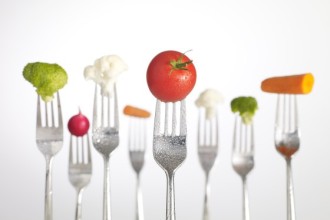We make on average 200 food-related decisions every day. Add the increased reporting of health and food issues, stir in a liberal amount of contradictory information and season with the fact that the simple supermarket shop now requires a science degree to analyse product labels and you have the perfect recipe for consumer confusion and anxiety. Life is fast and stressful; we need easier ways of discerning food fact from fiction to help navigate the maze of nutrition confusion.
- When it comes to diet no one-size-fits-all. We are all unique with highly individualised nutritional requirements. Differences in anatomy, metabolism, body composition and cell structure all influence our overall health. Men eat differently than women, children eat differently than adults and we all have very different preferences. That’s why no single way of eating works for everyone. The food that is perfect for your body, age and lifestyle may make another person gain weight or feel lethargic. Our personal tastes and inclinations, natural shapes and sizes, blood types, metabolic rates and genetic backgrounds influence what foods will and won’t nourish us. Tip: Don’t get sucked in by the latest celebrity diet, you have to work out what works for you.
- The media has its own agenda. Few of us have the time, academic training or inclination to read scientific journals on nutrition, so we rely on journalists and popular writers to make the material more accessible. When this works well the media provides us with sensible guidelines based on current and emerging scientific research. The problem is, social media and the rise of the 24 hour news cycle has created a generation of consumers who expect instantly refreshed content – that’s a lot of column inches to fill. This, coupled with the fact that we are primed to react to health and food scares, often results in sensationalist and misleading articles. Journalists tap into our need for control over something that frightens us and crowbar fractional research findings into ‘miracle-cure-hidden-scare’ templates. Tip: Be discerning about what you read; consider the source, is it based on statistically significant unbiased research or a food manufacturer with a potential conflict of interest. Think about the language used, is it balanced or designed to alarm.
- We want to be seduced. Food manufacturers seduce us with instant meals, zero calorie, low fat options, and pots and bottles containing our 5 a day, and let’s face it, we want to be seduced. But if we’re honest we know that zero calorie and artificially sweetened snacks have consequences, that low fat foods are only palatable because of the added sugar and ‘gluten-free and low carb’ options are often still junk food – we just want to believe, so pretend otherwise. Tip: Follow the 80/20 rule where possible, if you eat sensibly for 80% of the time, that’s 5 days out of 7, you can relax a little for the remaining 20%, 2 days.
- As with most things, we need to recognise the whole is more than the sum of its parts. The commercial reality is that advising consumers to eat whole foods is a dull message that doesn’t sell magazines, foods or supplements. Because of this the media and manufacturers adopt a reductionist approach to nutrition, looking at parts of diet rather than the whole or single food components rather than food habits. Today Broccoli fights cancer but look back in the newspaper archives and you’ll find articles reporting broccoli is carcinogenic, bad for the thyroid, and contains the highest levels of pesticides, it’s no wonder we’re confused! Even though a great deal of progress has been made with this approach, the relationship between diet and health is still not fully understood. Tip: Focus on the bigger picture, not specific nutrients like iron and omega 3’s and their individual effects. Healthy populations eat diets dominated by whole plant foods with small amounts of meat and fish and little to no processed foods, they don’t need or care to know that the monounsaturated fatty acids in olive oil raise HDL levels or that dairy calcium improves bone density.
So, what can we do to make things easier, Michael Pollan summed it up best when he said “Eat food, not too much, mostly plants.” Follow my 5 easy rules and you won’t go far wrong!
- Don’t eat anything your great grandmother wouldn’t recognise as food. When you pick up that box of squeezy yogurt tubes, plastic cheese, ready meals with 15 ingredients you can’t pronounce, you have to ask yourself why they are in there and what they are doing to your body.
- Stick to the perimeter of supermarkets. Real foods; fruit, veg, meat and fish tend to be on the outer edge of the store near the loading docks where it can be replaced with fresh foods when it goes bad. The middle aisles generally contain processed goods.
- Don’t eat anything that won’t eventually rot. There are exceptions such as honey, but as a rule convenience foods and processed products that never go bad aren’t food.
- Remember your bio-individuality, the diet that’s right for you will depend on your gender, age, lifestyle, stress levels and personal health, if you’re diabetic, you need to cut carbs, despite what the eatwell plate advises, if you have low thyroid function kale and broccoli are not the super-foods for you.
- Last but not least, unfortunately portion size counts!

Shani Shaker BA (hons), dipION, mBANT, CNHC is a registered nutritional therapist with a focus on regenerative and functional nutrition, disordered eating, addiction and mental health. Based in London her services include one-to-one coaching, group classes and Skype sessions. Contact her at [email protected]
Disclaimer: The information provided is intended for your general knowledge only and is not a substitute for professional medical advice or treatment for specific medical conditions. Please consult your healthcare provider with any questions or concerns you may have regarding your condition. Supplementation should only be temporary. If you’re eating a nutrient-rich diet, extra supplementation should only last for a month or two, just long enough to resolve the deficiency.




